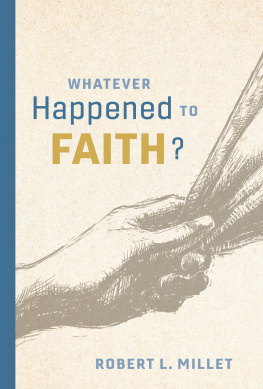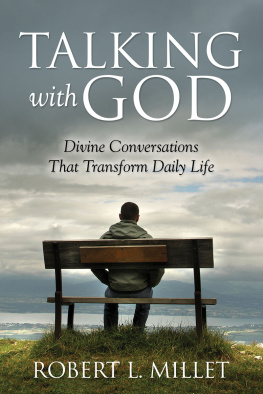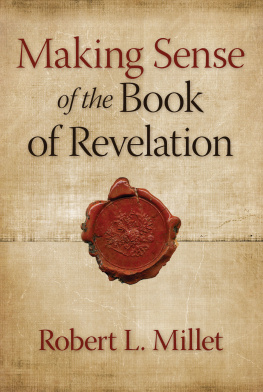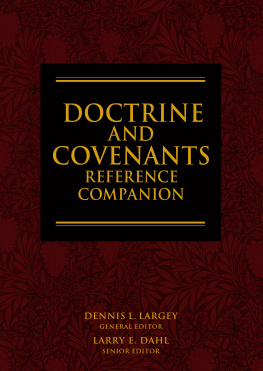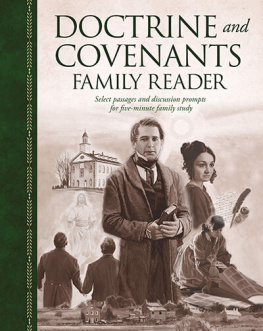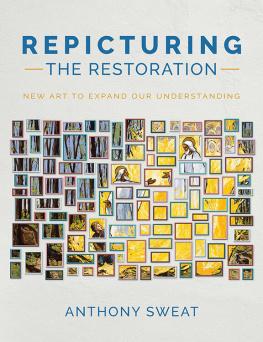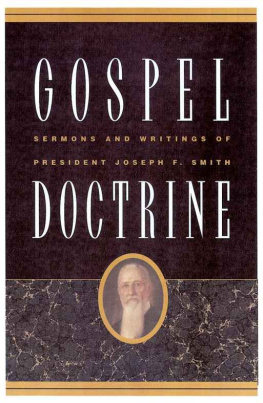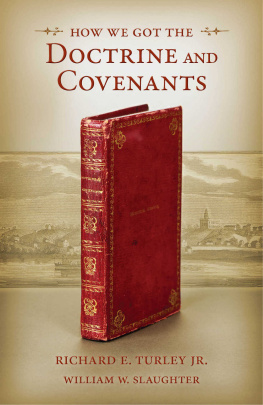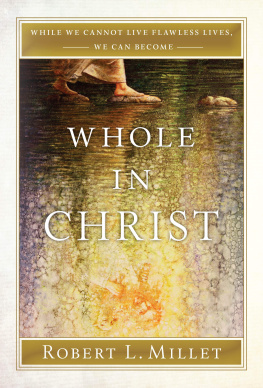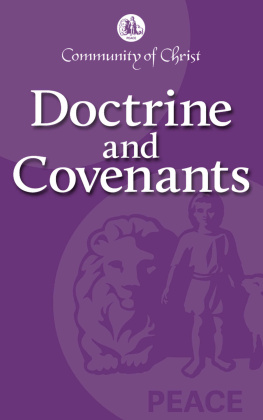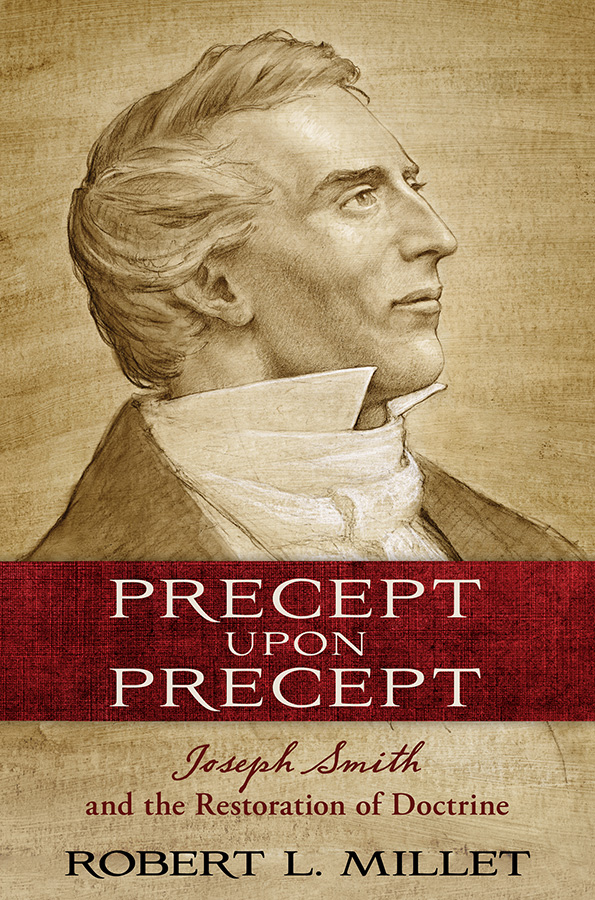To my beloved Shauna
whose friendship, loyalty, sweet companionship, and love make eternity seem too brief
I t is my meditation all the day, and more than my meat and drink, to know how I shall make the Saints of God comprehend the visions that roll like an overflowing surge before my mind.
Joseph Smith
T here is not so great a man as Joseph standing in this generation. The gentiles look upon him as he is a bed of gold concealed from human view. They know not his principles, his spirit, his wisdom, his virtues, his philanthropy, nor his calling. His mind, like Enochs, expands as eternity, and only God can comprehend his soul.
Wilford Woodruff
Contents
Preface
Jehovah spoke through Isaiah of how divine truth is conveyed to mortals: For precept must be upon precept, precept upon precept; line upon line, line upon line; here a little, and there a little (Isaiah 28:10; compare 2 Nephi 28:30). Almost always a merciful God will make known doctrines and principles gradually. Though you and I may occasionally be impatient with the Lords system of gospel prerequisites, he established it for a wise purpose. It is a quiet illustration of the tender regard and sweet kindness our Father in Heaven has for his children: he gives to us that which we are prepared to receive. This is, in fact, the manner in which the Almighty has dispensed the truths and authorities of the restored gospel. Fourteen-year-old Joseph Smith certainly did not understand in the spring of 1820 what he understood by the time he went to a martyrs death in 1844. His divine schooling, like that of all Saints, was incremental.
It has been observed that doctrine is the basic body of Christian teaching or understanding (2 Timothy 3:16). Christian doctrine is composed of teachings which are to be handed on through instruction and proclamation.... Religious doctrine deals with the ultimate and most comprehensive questions.
There is power in doctrine, power in the word (Alma 31:5), power to heal the wounded soul (Jacob 2:8), power to transform human behavior. I have devoted much of my professional and ecclesiastical life to an intense study of the various doctrines of the Restoration and find myself turning to, savoring, and quoting or paraphrasing frequently from Joseph Smiths sermons or writings. In this book we will tell the story of Joseph Smith but not in a typical biographical fashion. Rather, we will look carefully at some of the most significant doctrinal moments and teachings of Josephs ministry and pursue our study, for the most part, chronologically. In one sense, this work might be described as a kind of doctrinal biography. In some cases we will see how certain theological matters introduced in the Prophets early ministry were added upon and clarified later by him or by his apostolic and prophetic successors, precept upon precept.
One challenge with a work of this sort is delimitation: everything simply cannot be covered in one book. Consequently, I have selected what I feel to be doctrinal highlights of the founding Prophet. You will notice, for example, that I have not attended to such matters as how the Book of Mormon was translated, the Word of Wisdom, the origins of the book of Abraham, the apostasy in Kirtland, persecution in Missouri and Illinois, the organization of the Relief Society, and the particulars of the Prophets martyrdom. Further, although I occasionally turn to doctrinal topics as they are presented in the Book of Mormon, Doctrine and Covenants, and the Pearl of Great Priceall of which came through Joseph Smithin a volume of this kind it is impossible to cover every doctrinal matter that arises in the Latter-day Saint scriptural canon or to touch on every significant historical moment.
I love and honor Joseph Smith as the Prophet of the Restoration and the head of the dispensation of the fulness of times. I have no hesitation in writing from the angle of faith and commitment; my personal perspective is strongly influenced by my belief. I am persuaded that Joseph was in many ways a prophets prophet. When I say that, I have in mind the following remark by Josephs brother Hyrum: Joseph has the spirit and power of all the prophets.
I have chosen to do something that is generally not done in a work of this sortto interact periodically with you, the reader. That is, I will at times insert an experience or a personal insight into a chapter or speak to you as if we were in a conversation. As a reader myself, I find such excursions tend to add warmth and a personal touch to a book.
We have witnessed in recent years a marvelous work in itself in the production of the Joseph Smith Papers, and the results are continually being made available to Latter-day Saints and other interested parties in published form as well as online. It is a deeply significant work, one that is still underway and will be for a number of years to come. The principal sources for quotations from Joseph Smith in this volume are, first, the official Church manual entitled Joseph Smith in the Teachings of Presidents of the Church series, and, second, the Joseph Smith Papers themselves. I have occasionally used other sources of the Prophets words, including the Church newspaper the Times and Seasons and The Words of Joseph Smith: The Contemporary Accounts of the Nauvoo Discourses of the Prophet Joseph. Spelling, punctuation, and grammar in many of these quotations have been modernized for readability.
While a prisoner in Liberty Jail in March of 1839, Joseph the Prophet wrote: Truth is Mormonism. God is the author of it. He is our shield. It is by Him we received our birth. It was by His voice that we were called to a dispensation of His Gospel in the beginning of the fullness of times. It was by Him we received the Book of Mormon; and it is by Him that we remain unto this day; and by Him we shall remain, if it shall be for our glory; and in His Almighty name we are determined to endure tribulation as good soldiers unto the end. Joseph Smith the Prophet believed, as did his followers, that The Church of Jesus Christ of Latter-day Saints was in very deed restored Christianity, the custodian of the fulness of the gospel of Jesus Christ and the only authority-bearing religious institution on earth. Joseph was persuaded, by personal and immediate encounter with the Divine, that what he taught was true, that what was being returned to earth through his efforts was the ancient order of things. Those who accepted Josephs witness of the work did so by the power of that Spirit that has been given by a gracious Lord to lead us into all truth (John 16:13).
Among many things that the Prophet Joseph Smith wrote from Liberty Jail is the following: Thy mind, O man! if thou wilt lead a soul unto salvation, must stretch as high as the utmost heavens, and search into and contemplate the darkest abyss, and the broad expanse of eternitythou must commune with God. How much more dignified and noble are the thoughts of God, than the vain imaginations of the human heart! It is my hope that you as a reader will find what follows to be rational and to conclude that it makes good sense, that the beliefs and practices of The Church of Jesus Christ of Latter-day Saints are as stimulating and stretching to the mind as they are settling and soothing to the heart (1 Peter 3:15).
In the preparation of this book I am indebted to many, many persons who have through the decades taught me in formal classroom settings, as well as through informal conversations, public lectures, or published writings, to love, revere, and demonstrate loyalty to the Prophet Joseph Smith. Though hesitant to list specific individuals for fear of neglecting others, I yield to the temptation slightly in order to express profound gratitude to Hyrum L. Andrus, Ivan J. Barrett, Robert J. Matthews, Truman G. Madsen, Richard Lloyd Anderson, Karl Ricks Anderson, Larry E. Porter, Milton V. Backman Jr., Larry E. Dahl, Donald Q. Cannon, and Joseph Fielding McConkie. Further, this book would not have materialized without special assistance from two dear friends at Deseret Book Company. First, Lisa Roper, product director, has encouraged and nurtured the book from concept to published work. Second, the careful editorial eye of Suzanne Brady has, once again, scrutinized and improved the product. I am deeply grateful to both.


